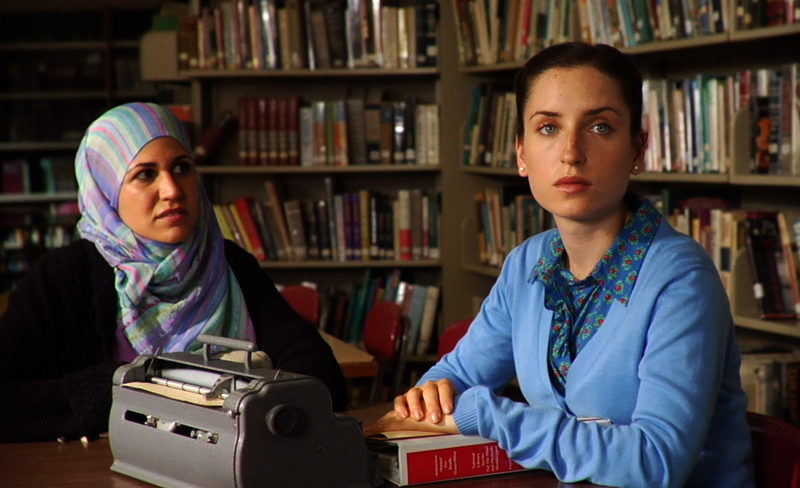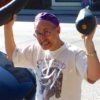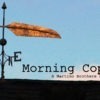
Faith by Two
Written by Jesse J. Logan | Posted by: Anonymous
On December 1st, he decided to meet "Molly," whose real name is Yuta Silverman, in person. And over the course of several weeks, her true-to-life account about the prospect of arranged marriage and a friendship that crossed religious barriers fascinated Schaefer and his directing and producing partner Diane Crespo. By May, there was a script. In late July, Shaefer and Crespo were in full-fledged production as co-directors and co-producers. "It was like a dream to move that quickly," says Schaefer.
Arranged is loosely based on Silverman’s life as a young Orthodox Jewish woman going through the matchmaking process. In the film, Rochel Meshenberg (Zoe Lister), a first-year teacher at a Brooklyn public school, meets another new teacher, a Muslim woman from Syria, Nasira Khaldi (Francis Benhamou), and they quickly become friends. Soon, they discover that they have more in common then they think.
Shaefer and Crespo have been working together for over 12 years — first in theater, now as partners for Cicala Filmworks, a production company they founded in 1997. This film marks the feature film debut for Crespo. NewEnglandFilm.com had an opportunity to speak with both filmmakers about their experience making the film and their approach to the subject of arranged marriage.
Jesse Logan: How much of the film was a biographical account of Silverman’s life?
Stefan Schaefer: I wouldn’t say it was strictly biographical but it was definitely rooted in her experiences. Yuta is an Orthodox Jewish woman from Borough Park, which is a pretty closed, insular, very conservative, Orthodox neighborhood. She has gone through the arranged marriage process and ultimately called it off after having gone on many, many, many dates. Whether or not she will continue down that road is up in the air. She also had her friend, a Pakistani Muslim woman who she had met because she’s a teacher and was working with this woman’s special needs child.
I took that and I just decided it would be a stronger narrative if both of them were first-year teachers in a public school and both were fish out of water in that public school context. That would be the reason why they would gravitate toward one another and see that they have so much in common.
JL: In addition to providing the initial concept for the story, did Silverman have a role during the filmmaking process itself?
Diane Crespo: She was on set everyday, and she was a really important part of the energy and environment that we were able to create with the actors and crew. We actually shot at her family’s home in Borough Park, which was a really great opportunity for us to be inside an Orthodox home. It has a very particular look. For us it was interesting to go in and be in these documentary locations with actors and it lent some authenticity to the whole process.
JL: One thing I noticed about the film was that there was no overt discussion of politics or conflict in the Middle East. Was that your objective?
Schaefer: We made the choice not to have any discussion of Palestine or the Middle East at all and just let that be an undercurrent in this friendship between two faiths. We were shooting in August and Israel was bombing Lebanon. It was pretty front and center in everyone’s minds. We just tried to have it be a friendship story between these two traditional women in the context of New York City and sort of have the audience bring whatever background and history and beliefs in their viewing of it, but not be too preachy.
Crespo: We were really trying to tell the objective story about two young women who are struggling with being observant while living in the 21st century. Getting to know Yuta and getting to learn a little more about that community, I see that as a real struggle particularly for women who are living in New York City, are educated, and want to live an observant life. I think it’s a really interesting struggle.
JL: In the film, tensions build as the impact of familial expectations, individual choice, and the temptations of the secular world collide. Like anyone, ultimately, the young women want a partner they can relate to, and with whom they share chemistry. During the filmmaking process, what did you learn about the complex dynamic of arranged marriage?
Schaefer: There’s some free will in there, too. But it’s a community decision more than an individual decision. For example, in Yuta’s family, her parents do have a very loving relationship. It wasn’t like parents sat down and said, ‘These two people are married.’ We thought that was something interesting to explore. And in terms of the arranged marriage component, we wanted that to be the main source of conflict in the film.
JL: The film was shot in 17 days in true indie fashion. What was that experience like and did you face any challenges working along those parameters?
Schaefer: Ultimately, I think we had a lot of fun. It was pretty amazing. We had a little bit of money and we said, ‘Let’s just do it.’ The casting directors had three weeks between casting The Sopranos and everyone was getting paid $100 a day except for us. We weren’t getting paid anything. So no one was out there for the money. And when you have that, it was just a good dynamic on set and then we had a lot of fun in post-production.
Crespo: Having the constraints actually caused us to be more creative. Although I do think there were times that any of us wished that we could have had even just 20 more minutes, I think that we were able to do something what we may not have done otherwise given more days or more time. I think you really have to make some hard choices. And we made them. I’m all for limited constraints.
Schaefer: And also getting paid, too, next time.
Crespo: Yeah, definitely.
JL: What’s next for you in terms of film projects?
Schaefer: There’s one that we’re developing right now that would shoot in New York and actually probably up in the Berkshires. It’s more of a dark, family, drama-comedy that involves the theme of fertility issues. That’s really early on in the process. It’s something that we are developing together and would direct together. I was also hired to write a script for Shirley MacLaine.
Crespo: I’ve been working on a coming-of-age story for a while. I’m a lesbian and I think there’s been a fair amount of gay and lesbian films made; but I feel like they are really adult driven and I’d love to make one that has more to do with the young person who’s discovering who they are along with everything else — not just their sexuality, but who they are in the world. So I’d love to tell a story that’s sort of based partially on my own life about coming to terms with who you are, including your sexuality — but not exclusively.
JL: What is your dream film or project?
Schaefer: To be on the first day of production on any film is a dream. It’s such a Herculean effort to get to that point. I think this next project we’re talking about, if we can get it off the ground, is going to be a lot of fun. And obviously the Shirley MacLaine project. If I end up directing that, that would be great.
Crespo: I guess the coming-of-age story is a dream project for me. I’d love to do a period piece. When I say period piece I’m talking about the 1970s. I’m not talking about turn-of-the-century. I grew up in New York. I think it would just be great fun to be able to shoot New York and have it be sort of a fun 1970s or 1980s kind of story. That would be my dream project.
JL: Stefan, I know you’re originally from Boston. Do you have any advice for New England filmmakers?
Schaefer: I guess it’s just general advice. I know that people always feel outside of the film world, if you don’t live in New York or Los Angeles. One of my cousins is from Boston and I know he feels like he needs to move to New York or L.A. to be part of the film scene; and I just think that’s not true. I think the great thing about digital film is that you can look at great films that were made anywhere… Just do it.
Jesse J. Logan is a writer and journalist based in the Greater Boston area.
Arranged screens on Friday, May 18th at 5 pm and Sunday, May 20th at 8 pm as part of the 2007 Berkshire International Film Festival. For more information, visit www.biffma.com, www.arrangedthemovie.com, or view a trailer at www.cicalafilmworks.com/arranged.mov. Jesse J. Logan is a writer and journalist based in the Greater Boston area.










